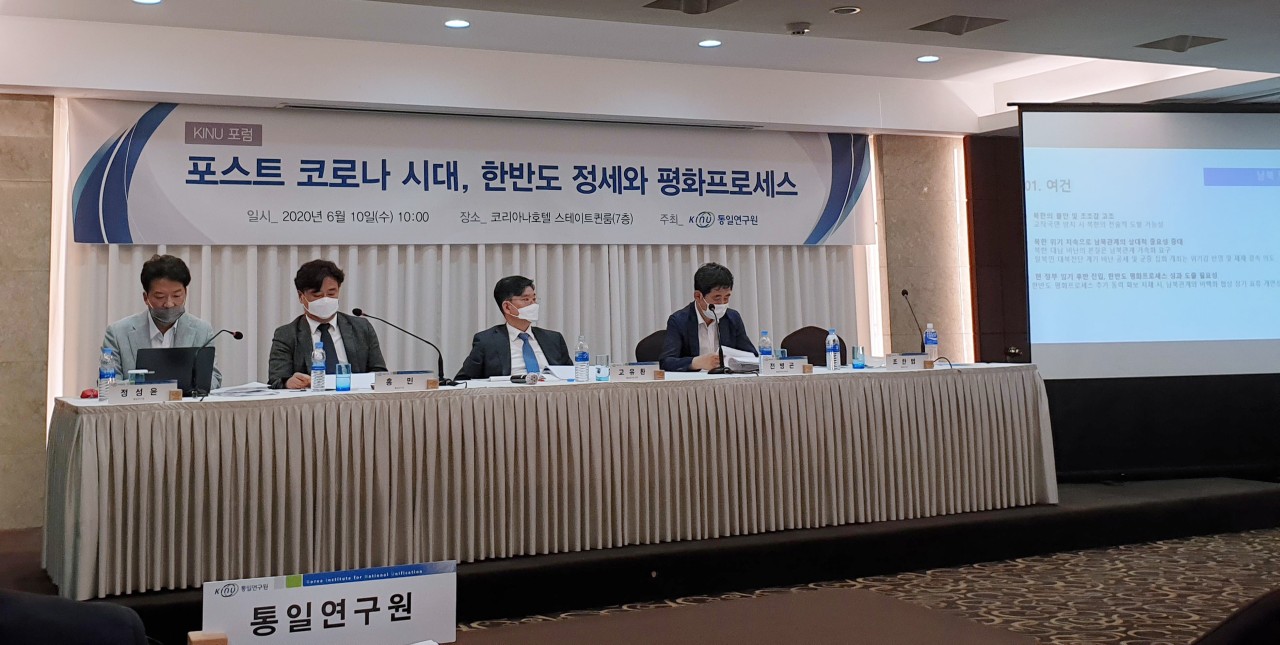Inter-Korean relations could be put back 20 years, experts warn
By Ahn Sung-miPublished : June 10, 2020 - 16:13

After North Korea severed all communications with South Korea, referring to South as its “enemy,” experts in Seoul agreed on the gravity of the situation and called for a breakthrough to mend the frayed ties before things get any worse.
“It’s a critical time where there is a mounting sense of crisis that (inter-Korean relations) could revert back to the period before June 15,” Koh Yu-hwan, president of the Korea Institute for National Unification, said Wednesday during a forum in Seoul organized by the South Korean government think tank. “We need a breakthrough on the fundamentals to change (inter-Korean relations) from the armistice status to the peace system.”
Koh was referring to the June 15 South-North Joint Declaration from the first inter-Korean summit between then-South Korean President Kim Dae-jung and North Korean leader Kim Jong-il in 2000. Next week marks the 20th anniversary of the historic summit, but the tension between the two Koreas has heightened lately.
On Tuesday, Pyongyang unilaterally terminated all cross-border communication channels with Seoul, saying that would be the first in a series of actions against its southern neighbor.
North Korea said ceasing contact -- and referring to all projects concerning the South as “projects against the enemy” -- was a response to the Seoul government’s failure to stop defector-run activist groups from sending anti-Pyongyang leaflets across the border. But experts suspect the underlying reason is to express dissatisfaction with the lack of progress on inter-Korean issues, to gain leverage in inter-Korean negotiations and to pressure the US.
“North Korea wants the South to play a leading role in persuading the international society and the US, and in regards to inter-Korean issues, but it views that Seoul hadn’t put much effort into it,” said Hong Min, a research fellow at the KINU. “In the beginning, it was right for Korea to step back, and work in relations with the US-North Korea denuclearization talks. But with the collapse of the Hanoi summit, Seoul should have come up with its own plan and worked toward leading on the inter-Korean issue.”
North Korea and the US have been in a stalemate since a summit between the two countries’ leaders broke down in Hanoi in early 2019. In January, Pyongyang said that dialogue with the United States could only resume when it fully accepted Pyongyang‘s demands.
Hong stressed that the foundation of the Panmunjom Declaration in April 27 and the Sept. 19 Pyongyang Declaration is to end the danger of war on the peninsula and reduce military tensions between the two Koreas.
“But since the declaration, except for the initial implementation of the military agreement, no progress has been made,” he said, stressing Seoul needs to pursue fulfillment of the military agreement before suggesting economic cooperation with the North.
Cho Han-bum, a senior research fellow, called on Seoul to draw Pyongyang into dialogue with a bold move, such as sending a high-level ambassador to the North.
“We need to consider sending high-level ambassador to the North that could lead to inter-Korean summit between the two leaders, in order to maintain trust between the two Koreas,” said Cho.
In Cho’s view, Pyongyang is willing to talk with Seoul and the US, but only in the right circumstances.
“If Korea suggests something striking, such as sending a high-level ambassador, the North is likely to respond,” he said. “With the North’s biggest event of the 75th founding anniversary of the ruling Workers’ Party in October approaching, the country needs results (in regards to inter-Korean relations).”
By Ahn Sung-mi (sahn@heraldcorp.com)







![[Graphic News] More Koreans say they plan long-distance trips this year](http://res.heraldm.com/phpwas/restmb_idxmake.php?idx=644&simg=/content/image/2024/04/17/20240417050828_0.gif&u=)
![[KH Explains] Hyundai's full hybrid edge to pay off amid slow transition to pure EVs](http://res.heraldm.com/phpwas/restmb_idxmake.php?idx=644&simg=/content/image/2024/04/18/20240418050645_0.jpg&u=20240419100350)






![[From the Scene] Monks, Buddhists hail return of remains of Buddhas](http://res.heraldm.com/phpwas/restmb_idxmake.php?idx=652&simg=/content/image/2024/04/19/20240419050617_0.jpg&u=20240419175937)

![[KH Explains] Hyundai's full hybrid edge to pay off amid slow transition to pure EVs](http://res.heraldm.com/phpwas/restmb_idxmake.php?idx=652&simg=/content/image/2024/04/18/20240418050645_0.jpg&u=20240419100350)

![[Today’s K-pop] Illit drops debut single remix](http://res.heraldm.com/phpwas/restmb_idxmake.php?idx=642&simg=/content/image/2024/04/19/20240419050612_0.jpg&u=)